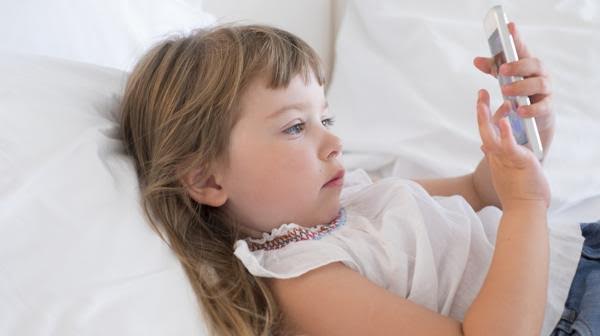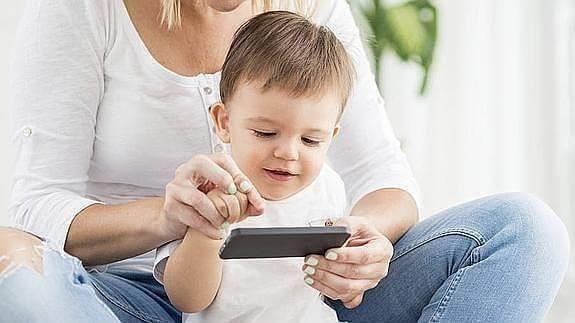The Use of "Touch Screens" Alter Your Child's Sleep


Reviewed and approved by the psychologist María Alejandra Castro Arbeláez
According to a British study on children’s sleep patterns, kids who spend a lot of time playing with smart phones or tablets lose sleep due to the hours they spend entertained in front of touch screens.
Don’t forget that besides being a distraction, these devices can also have other negative effects on children. Research tells us that they discourage curiosity and affectionate bonds. All of this can easily depress a child without us realizing it.
Researchers at the Birkbech University of London say that every hour children spend playing with touch screens will cause 15 minutes of less sleep. Sleeping less at night and more during the day can also lead to sleep disorders.
Technological devices, such as smart phones and tablets, undeniably bring positive contributions as well. However, they also greatly interfere with the way children interact with others.

Too much technology can be distracting
Regarding infants in particular, there have been various criticisms about how technology entraps them. It’s worrying to see them leave behind the whole universe of admiration and the capacity to imagine.
Imagination is undoubtedly the most beautiful gift of childhood.
Touch screen devices are the best excuse to avoid interaction with others. This has very harmful effects on children, such as causing them to lose concentration easily. Excess use of these devices can also inhibit social skills in children.
When a child uses a device, their brains release dopamine, the same hormone that satisfaction releases in an adult. Children become addicts to this sensation, which they sadly don’t find in everyday stimuli from a young age.
The use of touch screens has advantages and disadvantages
On the other hand, according to experts, children who play with tactile devices develop fine motor skills easily from a young age.
In order to perform their studies, the researchers surveyed a group of 715 parents with children under the age of 3.
The questions raised by the researchers to the parents were about the frequency with which their children played with smartphones or tablets. They also inquired about the children’s sleep patterns. The answers to the survey surprised the specialists at Birkberck.
The information provided voluntarily by the parents show that 75% of children use smartphones or tablets daily; and 51% of infants between the age of 6–11 months use touch screen devices. However, the percentage rose to 92% when dealing with children from 25–36 months.
In the study, children slept around 15 minutes less for every hour they spent playing with touch screens.
Researchers suggest that parents should limit the amount of time their child spends with this type of entertainment. Doing this will prevent them from losing precious sleep, among other things.
The researchers maintain that every minute counts when it comes to a child’s development. Sufficient hours of sleep are needed in order to achieve proper development.

Screens “rob sleep”
The use of touch screens, especially before bedtime, reduces the release of melatonin which is essential for sleeping. The loss of melatonin causes their biological clock to become unbalanced.
Although the study’s results are still not definitive, the researchers are confident that touch screens are related to sleep disorders during early childhood.
Although a child may seem to be concentrated when using a device, it’s actually been proven that these devices can cause them to be permanently distracted. They lose interest in the things happening around them and their curiosity also diminishes.
The overuse of these devices robs children of the capacity for paying attention, which is essential for learning.
Specialists say the best answer to this problem is to set clear rules about the amount of time young children can spend in front of screens. The use of these devices should especially be limited before bedtime.
According to a British study on children’s sleep patterns, kids who spend a lot of time playing with smart phones or tablets lose sleep due to the hours they spend entertained in front of touch screens.
Don’t forget that besides being a distraction, these devices can also have other negative effects on children. Research tells us that they discourage curiosity and affectionate bonds. All of this can easily depress a child without us realizing it.
Researchers at the Birkbech University of London say that every hour children spend playing with touch screens will cause 15 minutes of less sleep. Sleeping less at night and more during the day can also lead to sleep disorders.
Technological devices, such as smart phones and tablets, undeniably bring positive contributions as well. However, they also greatly interfere with the way children interact with others.

Too much technology can be distracting
Regarding infants in particular, there have been various criticisms about how technology entraps them. It’s worrying to see them leave behind the whole universe of admiration and the capacity to imagine.
Imagination is undoubtedly the most beautiful gift of childhood.
Touch screen devices are the best excuse to avoid interaction with others. This has very harmful effects on children, such as causing them to lose concentration easily. Excess use of these devices can also inhibit social skills in children.
When a child uses a device, their brains release dopamine, the same hormone that satisfaction releases in an adult. Children become addicts to this sensation, which they sadly don’t find in everyday stimuli from a young age.
The use of touch screens has advantages and disadvantages
On the other hand, according to experts, children who play with tactile devices develop fine motor skills easily from a young age.
In order to perform their studies, the researchers surveyed a group of 715 parents with children under the age of 3.
The questions raised by the researchers to the parents were about the frequency with which their children played with smartphones or tablets. They also inquired about the children’s sleep patterns. The answers to the survey surprised the specialists at Birkberck.
The information provided voluntarily by the parents show that 75% of children use smartphones or tablets daily; and 51% of infants between the age of 6–11 months use touch screen devices. However, the percentage rose to 92% when dealing with children from 25–36 months.
In the study, children slept around 15 minutes less for every hour they spent playing with touch screens.
Researchers suggest that parents should limit the amount of time their child spends with this type of entertainment. Doing this will prevent them from losing precious sleep, among other things.
The researchers maintain that every minute counts when it comes to a child’s development. Sufficient hours of sleep are needed in order to achieve proper development.

Screens “rob sleep”
The use of touch screens, especially before bedtime, reduces the release of melatonin which is essential for sleeping. The loss of melatonin causes their biological clock to become unbalanced.
Although the study’s results are still not definitive, the researchers are confident that touch screens are related to sleep disorders during early childhood.
Although a child may seem to be concentrated when using a device, it’s actually been proven that these devices can cause them to be permanently distracted. They lose interest in the things happening around them and their curiosity also diminishes.
The overuse of these devices robs children of the capacity for paying attention, which is essential for learning.
Specialists say the best answer to this problem is to set clear rules about the amount of time young children can spend in front of screens. The use of these devices should especially be limited before bedtime.
All cited sources were thoroughly reviewed by our team to ensure their quality, reliability, currency, and validity. The bibliography of this article was considered reliable and of academic or scientific accuracy.
- Del Valle, M. O. (2012). El sueño en la edad preescolar y su repercusión en el desarrollo, la conducta y el aprendizaje. Revista Cubana de Higiene y Epidemiología.
- Estivill, E., & Segarra, F. (2000). Insomnio infantil por hábitos incorrectos. Rev Neurol, 30(2), 188-91. http://amapamu.org/actividades/charlas2006/segarra.pdf
- Montserrat Gala, A. M., & Fortes del Valle, M. A. (2013). Aprender a dormir. Pediatría Atención Primaria, 15(60), e145-e155. http://amapamu.org/actividades/charlas2006/segarra.pdf
- Del Riesgo, A. B., & Velez, I. V. (1991). Errores en la crianza de los niños (Vol. 5). BEF, Biblioteca Ecuatoriana de la Familia.
- Cabano, S. (2014). El sueño infantil y el apego. https://www.colibri.udelar.edu.uy/jspui/bitstream/20.500.12008/4398/1/Santiago%20Cabano.TFG.2014.pdf
- Arboledas, G. P., Salort, M. M., & Marabotto, L. M. Higiene del sueño y melatonina. http://cursosaepap.exlibrisediciones.com/files/49-201-fichero/Higiene%20del%20sueño.pdf
This text is provided for informational purposes only and does not replace consultation with a professional. If in doubt, consult your specialist.








